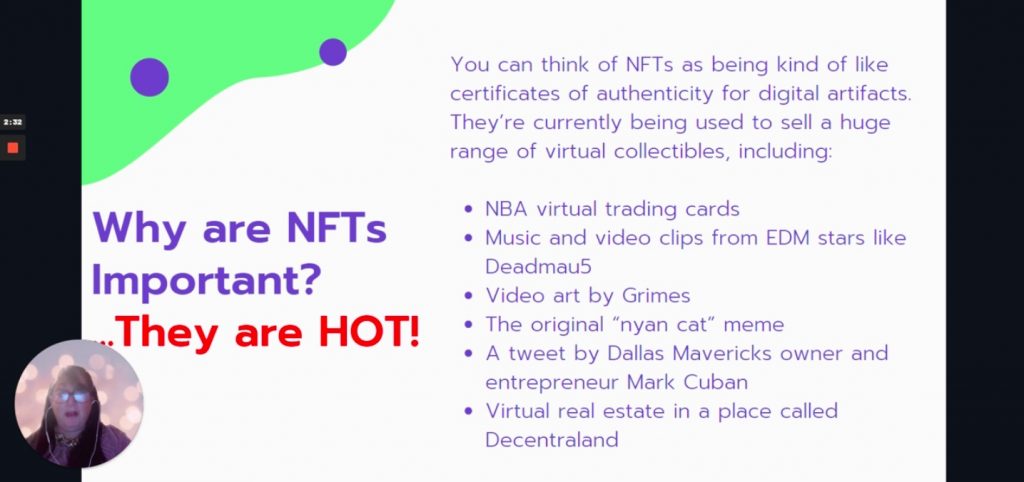Curiosities
Beeple Is Probably Right That NFTs Will Change Politics. So Far, That Change Is for the Worse
"Digital merch" or new-model way for the rich to sell access?

"Digital merch" or new-model way for the rich to sell access?

Ben Davis

Curiosities is a column where I comment on the art news of the week, sometimes about stories that were too small or strange to make the cut, sometimes just giving my thoughts on the highs and lows.
Here’s what caught my eye this week…
People have already used NFTs to make all kinds of statements and to raise money for all kinds of causes, from the worthy to the wacky. On the level of supporting actual political candidates, though, it’s still early days and there’s a lot of speculation. Let’s check in on the nascent field of political NFTs, shall we?
Beeple, the digital artist known for the success of his gross-out “Everyday” art posts as NFTs, seems an unlikely font of political wisdom. But here’s the auteur behind works such as Dick Milking Factory, inspiring change:
100% – why we are building the NFT platform for progressive campaigns and movements #NFT https://t.co/abhC55fZHm
— Front Row (@FrontRowNFT) December 13, 2021
Front Row, the organization piggybacking on Beeple there, drew headlines in October with its NFT fundraising vision. It debuted with an NFT series to support the Texas Democratic Party, but has been pretty quiet since, mainly tweeting generic pro-web3 content and birthday wishes to Hillary Clinton.
Democratic Party strategist and Front Row cofounder Parker Butterworth (whose name sounds like a character in a satire about a Democratic Party strategist) recently speculated to Politico that in the future, NFTs could serve as passes to augmented-reality campaign rallies or events in “digital living rooms.”
But Front Row’s inaugural effort, the “Lone Star Collection,” is, let’s face it, not super impressive. It consists of a series of digital images featuring the arrest warrants of Texas state senators who futilely protested Republican voting rights restrictions, embellished with their smiling portraits rendered “as spinning 8bit characters.” In shaping its aesthetic to fit the NFT vibe, it ends up lending a light-hearted, it’s-only-a-game vibe to the erosion of democracy.
The Lone Stars Making History – 1/1
The signature piece from the #LoneStarCollection features the 52 @TexasDemocrat State Representatives who participated in a valiant protest against voting restrictions as spinning 8bit characters https://t.co/vQUy4rhddM pic.twitter.com/ZDWfCVIINU
— Front Row (@FrontRowNFT) October 12, 2021
Although Butterworth promised last year that Front Row “will give Democrats across the country a fundraising advantage that its counterparts do not have,” so far, the percolating political NFT scene seems to be tilting to the right—which makes sense, given that Republicans are leaning hard into pro-crypto rhetoric.
Last year, Minnesota Republican Scott Jensen boasted of being the first political candidate to dip his toe into NFT fundraising with a line of folksy, Minnesota State Fair–themed NFTs. They showed the gubernatorial hopeful—running on a tough-on-crime, anti-lockdown, anti-abortion platform—cradling a calf, brandishing a corn dog, and dressed as a circus ringmaster in front of an elephant.
We are the FIRST political campaign in history to release our own line of NFTs! Check out the first two in our State Fair series.
PRONTO PUP: https://t.co/1O21HUATCX
LIFE IS A MIRACLE: https://t.co/5HrcZ8SaiZ@BirkMatt will be announcing two new exclusives Thursday! cc @garyvee pic.twitter.com/0OjdAL6nrC— Scott Jensen (@drscottjensen) September 1, 2021
And only a couple of weeks ago, New Jersey’s Morris County Republican Committee made ripples by diving into the NFT pool. “You can buy more than one and have the ability to resell them,” touts the MCRC’s website, in multi-level marketing mode. “But we encourage you to hold on and enjoy the benefits and special surprises that come with being a member.”

Slide from Laura Ali’s presentation about the Morris County Republican Committee’s NFT initiative.
But by far the most-watched, and most unnerving, political NFT comes via the Blake Masters campaign in Arizona.
Masters co-wrote the best-selling business strategy book Zero to One with Silicon Valley kingmaker/Donald Trump backer Peter Thiel. Indeed, these days he runs Thiel Capital, and is running for senate backed by Thiel. When Thiel quit the board of Meta this week, it was to spend more time promoting political candidates like Masters.
Masters does not exactly exude populist authenticity. He’s been stiffly engaging in “build the wall” and “America first” chest-beating, demanding that “critical race theory” be expelled from schools, calling Black Lives Matter activists “quasi terrorists,” and flirting with “Trump won” rhetoric.
But given his tech connections, a lot of his publicity—and a considerable chunk of his fundraising—has come from his NFT.
Launched in December, the Zero to One Origins NFT consisted of an edition of 99 images of the original design for Zero to One, a clothbound cover featuring the silhouette of Benjamin Franklin flying a kite. It looks more like a children’s book than the breezy Nietzsche-for-startups primer that it actually is. (The cover design, Masters oddly notes on the website, came from “our friend Dan,” though “Dan” later detached himself from the endeavor, “because once we sold the book to a publisher, ‘the project got too corporate.’”)
Some 99 lucky contributors who maxed out their campaign donations at the allowable $5,800 level received the NFT, the book, an “exclusive invitation to a Zero to One token holders party,” and access to a private Discord (where Zero to One superfans can, presumably, speculate about the whereabouts of Dan.)
These enticements worked. The Zero to One Origins NFT completely sold out in a matter of days in December, generating over $500,000 for the Masters campaign.
SOLD OUT. Gone in less than 36 hours. Can’t wait to show you guys what we’ve got planned next. Thanks for your support! ???? https://t.co/FUXnibrFS6
— Blake Masters (@bgmasters) December 28, 2021
Who bought them? Hard to say. From those who replied to Masters’s Tweet saying they were donating for the NFT, it looks like a lot of people who work in crypto.
According to Politico, Masters’s Thiel association has drawn a tidal wave of California tech donors who don’t often give to Arizona Republicans and are apparently willing to overlook Trump-adjacent demagoguery for a taste of sweet, sweet access to a billionaire thought leader. At intimate donor confabs featuring Masters and Thiel, “conversations are unlike those that typically take place at political fundraisers,” touching on China policy, robotics, deepfakes, Jeffrey Epstein, UFOs, and, duh, cryptocurrency.
So that “token holders party” should be a fun one!
Seriously though, it’s worth laying stress on the project’s promise of IRL meetups, the Discord perks, and the specific kind of influence the Masters NFT is teasing access to as key to its success. On some level Masters gets the political NFT proposition in a way that the Front Row NFTs do not. Political NFTs clearly work best when they are presented as more than just a way to raise money by selling spinning gifs.
The technology is a tool for bringing people together that can be used in good and bad ways, that’s Beeple 101. In this case, that also makes them look a lot like a new way to raise cash selling access to rich and powerful people, pretty much the exact opposite of “democratizing” anything. That’s the good ol’ American way.